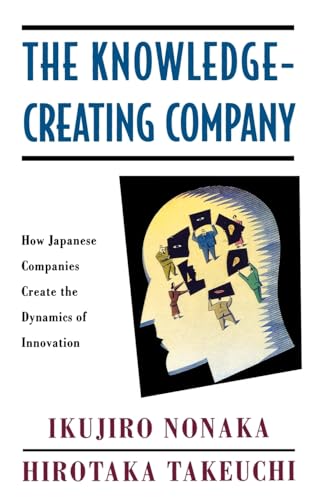The Knowledge-Creating Company: How Japanese Companies Create the Dynamics of Innovation
Nonaka, Ikujiro, Takeuchi, Hirotaka
About the Book
Description:
Item in good condition. Textbooks may not include supplemental items i.e. CDs, access codes etc. Seller Inventory # 00059742257
About this title:
Synopsis: How have Japanese companies become world leaders in the automotive and electronics industries, among others? What is the secret of their success? Two leading Japanese business experts, Ikujiro Nonaka and Hirotaka Takeuchi, are the first to tie the success of Japanese companies to their ability to create new knowledge and use it to produce successful products and technologies. In The Knowledge-Creating Company, Nonaka and Takeuchi provide an inside look at how Japanese companies go about creating this new knowledge organizationally.
The authors point out that there are two types of knowledge: explicit knowledge, contained in manuals and procedures, and tacit knowledge, learned only by experience, and communicated only indirectly, through metaphor and analogy. U.S. managers focus on explicit knowledge. The Japanese, on the other hand, focus on tacit knowledge. And this, the authors argue, is the key to their success--the Japanese have learned how to transform tacit into explicit knowledge.
To explain how this is done--and illuminate Japanese business practices as they do so--the authors range from Greek philosophy to Zen Buddhism, from classical economists to modern management gurus, illustrating the theory of organizational knowledge creation with case studies drawn from such firms as Honda, Canon, Matsushita, NEC, Nissan, 3M, GE, and even the U.S. Marines. For instance, using Matsushita's development of the Home Bakery (the world's first fully automated bread-baking machine for home use), they show how tacit knowledge can be converted to explicit knowledge: when the designers couldn't perfect the dough kneading mechanism, a software programmer apprenticed herself with the master baker at Osaka International Hotel, gained a tacit understanding of kneading, and then conveyed this information to the engineers. In addition, the authors show that, to create knowledge, the best management style is neither top-down nor bottom-up, but rather what they call "middle-up-down," in which the middle managers form a bridge between the ideals of top management and the chaotic realities of the frontline.
As we make the turn into the 21st century, a new society is emerging. Peter Drucker calls it the "knowledge society," one that is drastically different from the "industrial society," and one in which acquiring and applying knowledge will become key competitive factors. Nonaka and Takeuchi go a step further, arguing that creating knowledge will become the key to sustaining a competitive advantage in the future.
Because the competitive environment and customer preferences changes constantly, knowledge perishes quickly. With The Knowledge-Creating Company, managers have at their fingertips years of insight from Japanese firms that reveal how to create knowledge continuously, and how to exploit it to make successful new products, services, and systems.
From the Back Cover: Two leading Japanese business experts, Ikujiro Nonaka and Hirotaka Takeuchi, are the first to tie the performance of Japanese companies to their ability to create new knowledge and use it to produce successful products and technologies. In The Knowledge-Creating Company, Nonaka and Takeuchi provide an inside look at how Japanese companies go about creating this new knowledge organizationally. The authors point out that there are two types of knowledge: explicit knowledge, contained in manuals and procedures, and tacit knowledge, learned only by experience, and communicated only indirectly, through metaphor and analogy. U.S. managers focus on explicit knowledge; the Japanese, on the other hand, focus on tacit knowledge. And this, the authors argue, is the key to their success - the Japanese have learned how to convert tacit into explicit knowledge. To explain how this is done - and illuminate Japanese business practices as they do so - the authors range from Greek philosophy to Zen Buddhism, from classical economists to modern management gurus, illustrating the theory of organizational knowledge creation with case studies drawn from such firms as Honda, Canon, Matsushita, NEC, Nissan, 3M, GE, and even the U.S. Marines. In addition, the authors show that, to create knowledge, the best management style is neither top-down nor bottom-up, but rather what they call "middle-up-down", in which the middle managers form a bridge between the ideals of top management and the chaotic realities of the frontline. As we make the turn into the twenty-first century, a new society is emerging. Peter Drucker calls it the "knowledge society", one that is drastically different from the "industrial society",and one in which acquiring and applying knowledge will become key competitive factors. Nonaka and Takeuchi go a step further, arguing that creating knowledge will become the key to sustaining a competitive advantage in the future. Because the competitive environment and customer preferences change constantly, knowledge perishes quickly. With The Knowledge-Creating Company, managers have at their fingertips years of insight from Japanese firms that reveal how to create new knowledge organizationally, and how to exploit it to make successful products, services, and systems.
Bibliographic Details
Title: The Knowledge-Creating Company: How Japanese...
Publisher: Oxford University Press
Publication Date: 1995
Binding: Hardcover
Condition: Good
